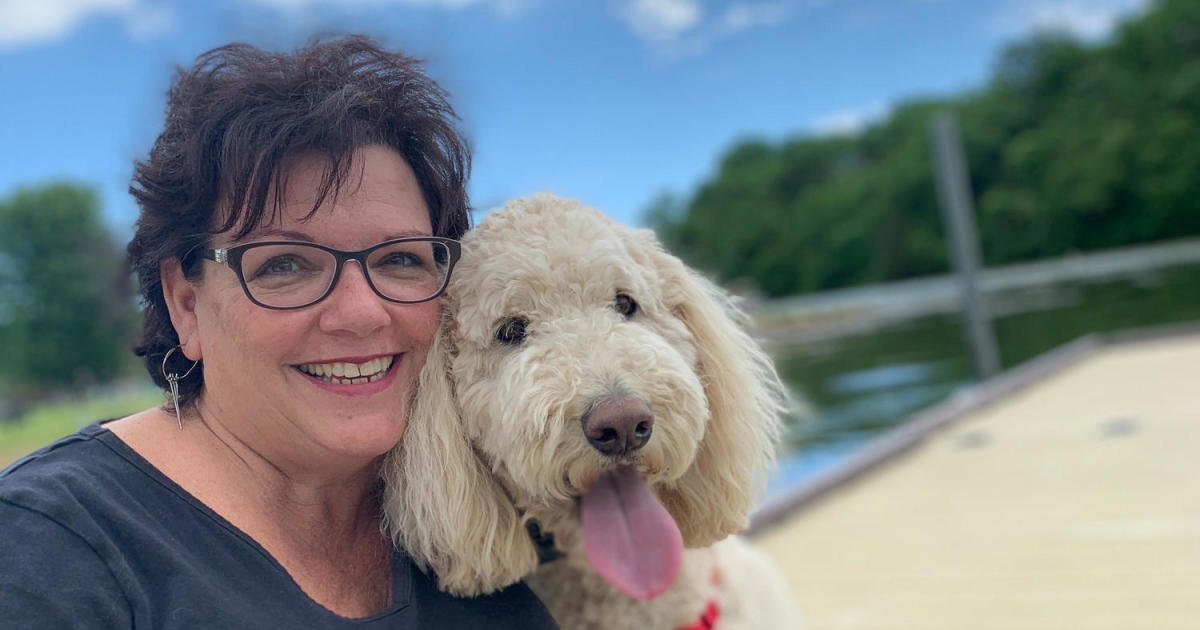CBS News
Romance scammers turn victims into “money mules,” creating a legal minefield for investigators

In the first months of her online relationship with a man calling himself Frank Borg, Laura Kowal was showered with love notes and spent hours on giddy phone calls. By year two, those exchanges were methodical and transactional, with Frank instructing Kowal how to set up fake companies and bank accounts to move money.
“I believe that she got so deep into this scam, and realized she was being scammed, and when she tried getting out of it, she became what is known in these scams as a ‘money mule,'” Kowal’s daughter, Kelly Gowe, explained. “They got her hooked into it.”
Laura Kowal’s experience of being drained of her savings and then manipulated into helping overseas-based scammers hide and move money — even setting up new fake profiles for them — is part of a diabolical new twist to the nation’s romance scam crisis, law enforcement officials told CBS News.
A yearlong investigation by CBS News found that scammers have been increasingly successful in leveraging their romantic grip on victims by turning them into unwitting co-conspirators, or “money mules.”
This process of fraudsters manipulating victims into perpetuating their schemes has created a legal minefield for investigators. Often, prosecutors are left to decide how to charge people who have morphed from targets to accomplices — particularly when they have openly committed fraud or helped launder millions of dollars swindled from others.
Family photo
The scam tactic has now become so widespread that federal agents are broadcasting warnings that urge people to think twice before helping someone they met online to move money.
“They’re committing a crime”
James Barnacle, the head of the FBI’s financial crimes section, told CBS News the FBI has developed psychological profiles of “money mules” to try to understand how to better deal with the problem. The challenge, he said, is that scammers have become better at gaining control over their victims.
“As the victim gives money, the asks continue. And we see an expansion of the ask,” Barnacle said.
Increasingly, he said, that includes instructions to the victim to help the scammers move money. Leaning on the trust they’ve established, the scammers wire money they’ve stolen from one victim into another victim’s new bank account.
“They think it’s business proceeds for their lover,” Barnacle explained.
Scammers then instruct the victim to wire that money internationally, withdraw it in cash and have couriers pick it up, or transfer it into a cryptocurrency.
“They’re committing a crime at that point,” he said. “They’ve committed bank fraud.”
The chains of transactions also create a new point of leverage that scammers can lord over their victims to coerce them into continuing to help — they are now criminals, too.
“Could the bad guy use that as a hook?” Barnacle said, “Absolutely. And they do.”
Victim or criminal?
Retired U.S. Postal Inspector Natalie Reda investigated many romance schemes where she says the victims fell so hard for their scammers, they “check their reasoning at the door.”
The dynamics are complicated for law enforcement, she said. On the one hand, they are dealing with a vulnerable person who has been manipulated by a sophisticated actor. On the other hand, that person is also committing crimes that may victimize others.
Reda said it’s a challenge to know how best to approach the “money mule” — as a victim or criminal. She said she always took a gradual approach, starting with a warning: “Stop doing this. You’re committing a crime.”
Reda said she moves slowly, telling them, “We’re not gonna do anything now, but if we have to come back, you know, you’re looking at criminal charges.” Often, she said, “they’ll keep doing it.”
There’s no indication that Laura Kowal was ever warned by law enforcement to stop. But she was on their radar, records show. At the time of her death, in 2020, Kowal had been “under investigation by federal law enforcement for possible criminal behavior involving the creation of LLCs for money laundering,” according to a Missouri Highway Patrol report. Kowal was found dead that summer in the Mississippi River; an autopsy report concluded she drowned.
Her daughter found the trail of her mother’s activities and realized she had created fake dating profiles on behalf of Frank Borg, opened bank accounts for him, and even bought a burner phone to communicate. She believes Kowal was coerced, even threatened into working for the scammers.
CBS News
“It just really saddens me that it got to that point that ultimately she was participating in illegal behaviors,” Gowe said. “I believe that she was doing that, though, because she felt like she had to. There was no other choice. That she was under an order to have to participate with what the scammers were asking of her.”
A “dumb-ass scheme”
One of Kowal’s initial payments for $75,000 made at “Frank’s” request was actually received by three people living in the Chicago suburbs, according to law enforcement. Authorities have indicted two of the men, both Nigerian nationals, Samuel Aniukwu and Anthony Ibekie, and an American woman named Jennifer Gosha whom they allege was helping the men to set up bank accounts and move money.
The criminal complaints against the three say undercover agents made secret recordings that show their involvement in romance-fraud and a range of other schemes. Investigators allege the trio’s scams resulted in at least $750,000 in losses for victims.
Aniukwu pleaded guilty to wire fraud and money laundering in July 2023 and has agreed to cooperate with prosecutors as part of his plea deal. He faces a maximum sentence of 30 years in prison, but a sentencing date has not yet been set. Meanwhile, Gosha and Ibekie, both of whom have pleaded not guilty, are scheduled to face trial in June.
In January, Gosha, a U.S. post office employee and Iraqi war veteran, appeared in court intending to enter her own guilty plea. She told the court she suffered from post-traumatic stress from her military service. As the judge advised her that a guilty plea would make her a felon and compromise her post office pension, she backed out of the deal.
In an interview with CBS News, Gosha explained that she had been dating Ibekie, whom she thought was a Nigerian doctor, and had plans for them to build a life together. As they grew closer, she said Ibekie began asking her to do things for him.
“You know, like things that people in relationships do,” she said. “Can you pick up my dry cleaning? Can you order this thing from Macy’s? Can you stop by and grab it? My car is in the shop: Can you pick me up? Stuff like that,” Gosha said.
Over time, the requests became more involved, she said. But she said she continued to believe him, “because when I met him he drove a Mercedes truck, he said he was a doctor, he had on the Rolex, he was dressed nice, his house was phenomenal.”
When she was arrested on charges of conspiring with Ibekie, she said she felt she had been trapped — a victim of a different sort. “If I’m someone who’s ‘complicit’ in it, why am I left here not with 50 cents?” Gosha told CBS News.
If convicted, she faces a potential 30-year sentence. Gosha described feeling helpless to counter the weight of government charges against her.
“I served in the Iraqi War, I raised my children, I went to school. I am not someone who decides after all I’ve accomplished in my life, ‘Now I’m gonna become a criminal mastermind?'” Gosha said during an interview on the front steps of her modest garden apartment in Chicago. “If I’m gonna come up with a scheme, it’s not gonna be this dumb-ass scheme.”
Gosha acknowledged to CBS News that she does think about the fate of the people whose money passed through her boyfriend’s accounts — the lives that were ruined. However, she maintains, “I didn’t ‘play a part in it’ knowingly.”
A challenge for local police
The volume and complexity of the scams make these kinds of cases particularly taxing for local police, several of whom told CBS News they are deeply frustrated by the lack of options to address the steady flow of complaints they receive, often from the adult children of divorced or widowed victims.
Mark Solomon, a retired police officer who heads the International Association of Financial Crime Investigators, said he has heard about victims being turned away by police, either because they do not sympathize with a victim who is giving away their money to a stranger, or because they don’t see a path to solving a crime that starts halfway around the globe.
“There are a lot of people being turned away that have the courage to report this,” Solomon said. “We have to train more local detectives and investigators… [that] this is the new wave of how money is going to be laundered.”
David Parrish, the sheriff in Lewis County, Missouri, where Laura Kowal’s body was found, says it may be that scams are outpacing law enforcement’s ability to intervene.
“Online romance scams are a scourge, we deal with it every other week,” Parrish said. “We are constantly chasing our tails. We are always behind the eight-ball on this. Always.”
Authorities who work to combat scammers said, ultimately, it’s hard not to sympathize with victims who have lost so much.
“It seems to all go back to the same thing: They are just hopeful. It’s love, someone loves them,” said Reda, the retired postal inspector. “It’s very sad. It really is. It’s hard to watch.”
CBS News investigative reporters Clare Hymes and Alyssa Spady contributed to this report.
If you or someone you know has been affected by a romance scam, please share your store with us at RomanceScams@CBSNews.com
CBS News
One year after Oct. 7 attack, the toll on civilians remains high

Watch CBS News
Be the first to know
Get browser notifications for breaking news, live events, and exclusive reporting.
CBS News
Open: This is “Face the Nation with Margaret Brennan,” Oct. 6, 2024

Watch CBS News
Be the first to know
Get browser notifications for breaking news, live events, and exclusive reporting.
CBS News
Kamala Harris will speak with “60 Minutes” tomorrow. Here’s what to know for the interview.

Voters will get the chance to hear from Vice President Kamala Harris on Monday as she presents her case for why she should be president in a “60 Minutes” election special.
For decades, “60 Minutes” has featured both Republican and Democratic nominees for presidents, but this year, former President Donald Trump backed out after previously indicating he would be on the show. Correspondent Scott Pelley, who’d been set to interview Trump, will instead travel to Arizona’s Maricopa County, home to more than 60% of Arizona’s voters and a critical battleground in a key swing state.
One thing is certain about the election; with the U.S. deeply involved in both the wars in Ukraine and the Middle East, whoever wins on Nov. 5 will become a wartime president.
What Harris will discuss
Israel’s war started one year ago after Hamas launched a surprise terror attack and correspondent Bill Whitaker will discuss the ongoing war with Harris.
Harris will also discuss the economy, immigration, her record as vice president and the differences between herself and Trump.
Democratic vice presidential candidate Gov. Tim Walz will also appear.
Whitaker joined the Democratic ticket on the campaign trail this week to gain insight into their platform’s priorities and values, and what the candidates believe voters should know.
Why Trump pulled out of the “60 Minutes” interview
Leading up to the candidate hour, Trump, through campaign spokespeople, was the first candidate to accept the “60 Minutes” request to be interviewed for the special, according to CBS News. It had been agreed that both candidates would receive equal time during the broadcast.
Trump last sat down with 60 Minutes in 2020. He walked out during the interview with Lesley Stahl. Trump referenced the incident on Tuesday night at a Milwaukee press conference when asked about his decision not to participate in the Oct. 7 “60 Minutes” election special.
“Well, right now, I went to – they came to me and would like me to do an interview, but first I want to get an apology, because the last time I did an interview with them, if you remember, they challenged me on the computer,” Trump said. “They said the ‘laptop from hell’ was from Russia, and I said it wasn’t from Russia. It was from Hunter, and I never got an apology, so I’m sort of waiting. I’d love to do ’60 Minutes.’ I do everything.”
The Republican nominee for president emphasized that he felt he was owed an apology from “60 Minutes.”
“Let’s see if they do it. I wouldn’t mind doing 60,” Trump continued. “I’ve done ’60 Minutes’ a lot.”
In a statement on Tuesday, Trump campaign communications director Steven Cheung said that Trump’s team had not agreed to an interview.
“Fake News,” Cheung said in a post on X. “60 Minutes begged for an interview, even after they were caught lying about Hunter Biden’s laptop back in 2020. There were initial discussions, but nothing was ever scheduled or locked in. They also insisted on doing live fact checking, which is unprecedented.”
Previous Trump, Harris appearances on 60 Minutes
Trump previously sat down with “60 Minutes'” Mike Wallace in 1985, Pelley in 2015 and Lesley Stahl twice in 2016, first in July of that year and then again in November of 2016. He also spoke with Stahl again in 2018 and 2020.
Harris previously sat down with Whitaker last year. She also was interviewed by Norah O’Donnell, “CBS Evening News” anchor and “60 Minutes” contributing correspondent, in 2020.





